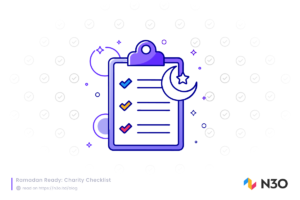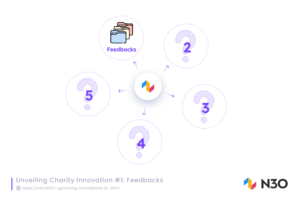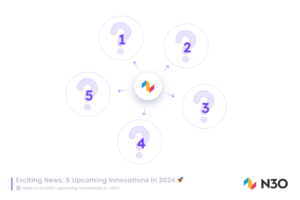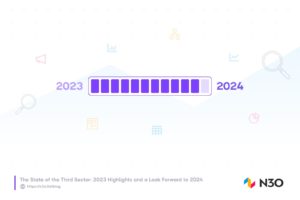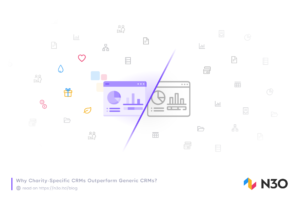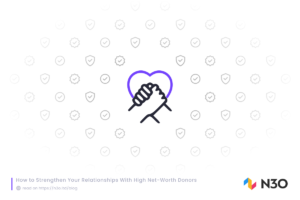Sponsorship schemes are slowly becoming a major way of charities connecting donors to individual beneficiaries. Whether they are orphans, students or families, these programmes can provide important, regular assistance to people who would otherwise struggle.
These schemes, however, are notoriously difficult to manage. This is because your charity has to manage potentially thousands of one-one relationships. In these cases, the only way to manage these effectively is to utilise a CRM system to keep track of these connections.
In this article, we will briefly touch upon 5 things you must consider when trying to technically manage your sponsorship programme:
1. Capture your beneficiary data
The first step before anything is to have a system which can identify and collate the necessary beneficiary data (information about those who will be sponsored). If you are sponsoring orphans for example, then you will need the traditional family information, guardian details, which school they attend etc.
Your CRM needs to be able to facilitate collecting different data types to create the right structure. This is paramount and is easily the foundation upon which an efficient sponsorship programme is based.
Key data types include dates, free text fields, radio check-buttons for selections, pre-defined lists etc. These need to be configured in advance to ensure that you collect data in a structured format.
In addition, if you run multiple sponsorship programmes (e.g. for students, families or widows), then each sponsorship type is going to require distinct information from the other. E.g. Student sponsorships will require the school details whilst family sponsorships may require details of all associated siblings. Your CRM therefore has to have the flexibility to allow you to collect different types of information.
2. Track the payments (inbound and outbound)
As mentioned previously, a number of organisations may depend on excel sheets or work-arounds on their current CRM to track sponsorship payments. Anyone who has tried this knows that though it may be manageable for 50 sponsorship relationships, it can become extremely complicated when dealing with large numbers (e.g. > 1,000 relationships).
There are two main types of payments which need to be tracked;
- Inbound donations – these are the specific donations received for the sponsored individual. E.g. Donor A is sponsoring beneficiary X with a monthly stipend of £30 a month or £360 annually.
- Outbound payments – these are the payments sent from the charity to the beneficiary on a monthly basis, minus any admin fees. E.g. The charity transfers £28 on behalf of Donor A to beneficiary X.
As you can see from the above, there are two important transactions taking place which must be tracked accurately. Why? Because, if these are not tracked efficiently you can run into a whole host of issues. Alternatively, you have to handle numerous different scenarios. For example:
- How often do you send the money abroad to the beneficiary? Is it monthly, quarterly or annually? In each case, you require a process to be able to track and allocate these payments accordingly.
- If it’s a monthly stipend to the beneficiary, are they expecting the money monthly, despite the frequency of when you send the money across? If that’s the case, then the CRM needs to track 3 pieces of information – the initial inbound donations, the monthly contributions expected to the beneficiary and any balances/variances between these two so you can track payments accurately.
- What happens if donor’s direct debits drop off? What about if the orphan moves? The list is endless.
Anyone who works within sponsorship programmes knows that the above scenarios are not rare. These happen all the time due to the fluidity of these programmes and complexities of 1-1 sponsorship programmes.
We therefore advise to ensure these types of use-cases are considered when building or looking for a CRM.

3. Automate the donation process
In our time we have seen a number of sponsorship programmes operated by charities. Some have been quite smooth, despite managing thousands of donor-beneficiary relations at once.
Others have been extremely resource heavy. One organisation once had up to 5 staff working in their child sponsorship team as they were manually creating orphan packs and tracking feedback. This is not just susceptible to errors but the cost of 5 FTE’s (full-time equivalents) for project administration is extremely costly.
We therefore advise to automate the process as much as possible. For example, within our Engage CRM, the following process is generally followed and fully automated;
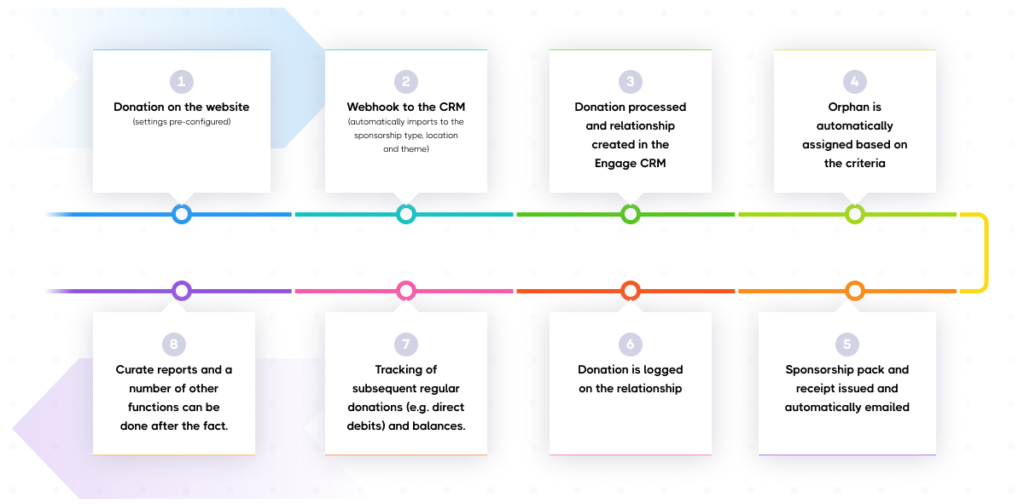
4. Beautify your communications
As with any type of communications in this day and age, our donor’s perception of quality is generated very quickly.
Therefore, it’s important to present engaging, well thought out communications to your donors so they feel confident when choosing your charity.
Once the data structure has been set and the sponsorship data inputted/uploaded, then a CRM ideally should be able to create the initial pack as a beautifully designed PDF. This will have been designed in accordance with your branding guidelines and inputting the relevant information on the beneficiary utilising merge fields e.g. Orphan name, address, hobbies, languages etc.
This could be through a custom builder or in most cases for bespoke design, this will require the ability to create custom HTML/CSS.
An example of this in action is an orphan pack profile from our Engage CRM (normally sent upon the first donation). As you can see below, the relevant merge fields are automatically populated in the pack design. There’s no doubt that beautifully designed correspondence is an eye-catcher and has a subsequent benefit of exuding trust that the charity is operating professionally.
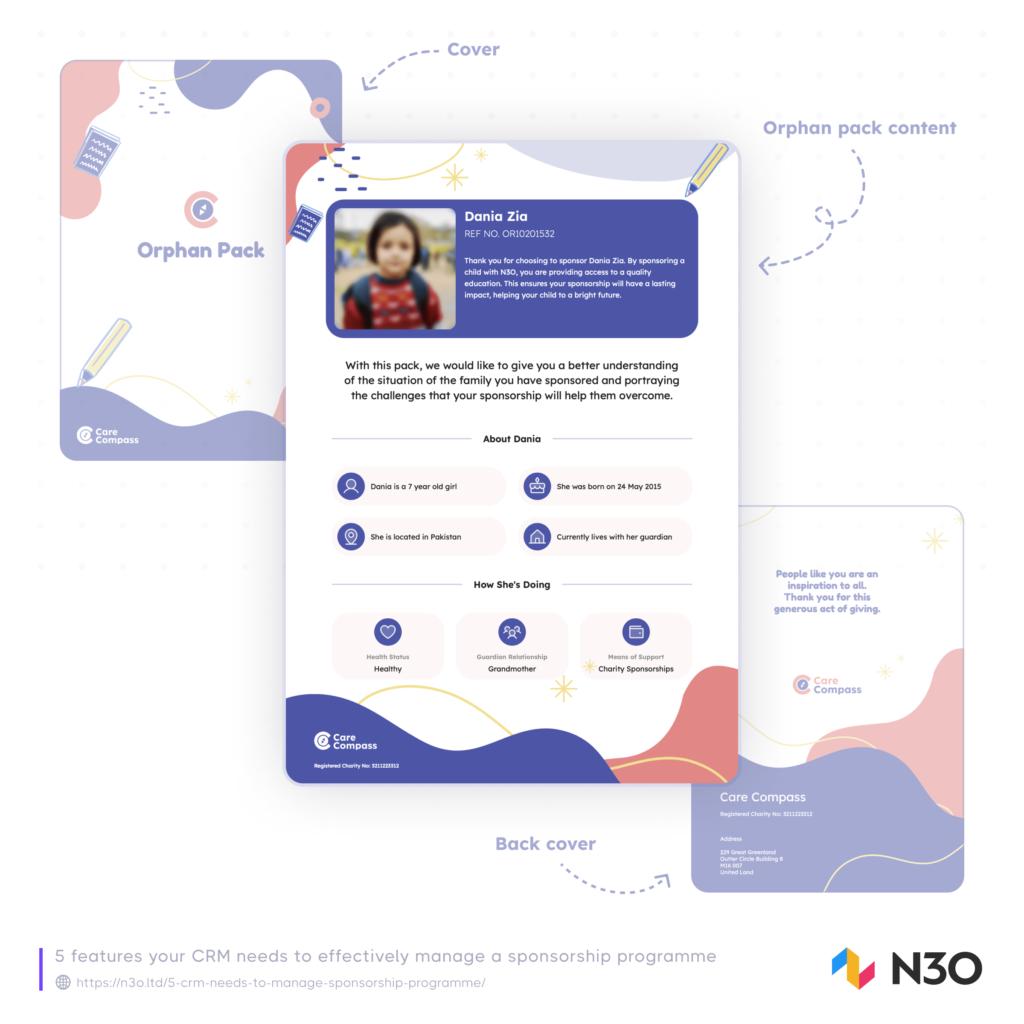
5. Feedback to donors
One of the most important elements for any sponsorship programme is feedback. By default, donors who sponsor an orphan or a family will expect specific, bespoke feedback on the person they are sponsoring.
Traditionally, organisations may tend to rely on external partners to generate word documents with sporadic data often by manually mail-merging from excel sheets. These also tend to vary in quality depending on if the data is coming from different locations. This feedback may be sent once a year to the donor and through our experience, prone to a number of delays due to a variety of factors. This can often lead to upset donors who may have supported the programme every month for a year.
How can a CRM therefore help? An effective CRM will have the ability to collate all the necessary data you need (as we covered in point 1 above). As long as the information is available in the system and appropriate templates can be produced, then there is no limit to how and when you feedback to your donors.
The key here is the flexibility to create multiple templates as per your needs. For example, with Engage CRM, we can work with you to create custom data points and templates for your feedback e.g. End of year annual reports, school reports, uploaded letters etc.
With some basic HTML knowledge and an understanding of automated triggers, a charity can send one, two or even three feedback reports to their donors every year. It just depends on the information they are collecting.
To save cost (and trees!), this can be via email which would immediately hit the inbox of the donor. Alternatively, they can be sent to a print queue so the donor has a more personalised experience.
Thank you
We hope you find the above points useful. This is by no-means an exhaustive list, however we felt these are key foundations by which you should consider to manage your sponsorship programmes effectively.
Please sign up below/follow us for more bespoke content on how you can run your charity effectively.
